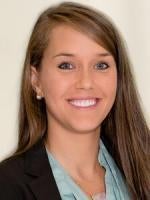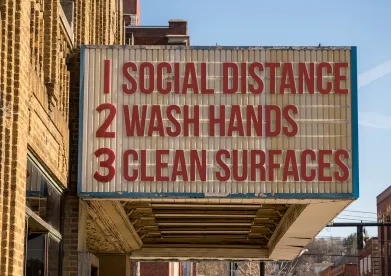We have written previously about the U.S. Department of Labor's ("USDOL") informal guidance and FAQs addressing compliance with the Families First Coronavirus Response Act ("FFCRA").
While we are adjusting to our collective new normal, we are certain of one thing: we are all living in a state of flux, and it seems legislation and interpretations are morphing, not just daily, but hourly in some cases. To keep you updated, we briefly summarize the key takeaways from USDOL's third round of FAQs.
- All employees as defined by the Fair Labor Standards Act, including part-time and joint employees, are eligible for paid sick leave or expanded family and medical leave under the FFCRA, with a few exceptions: (see FAQs 39; 55-57)
- Employees working for health care providers (which is broadly defined by the USDOL's new guidance to include most entities working in the medical industry) may be exempt at the choice of their employer. We provide more information on this issue here.
- Emergency responders also may be exempted from the paid leave provisions by their employer. An emergency responder broadly includes those who are necessary to provide transport, care, health care, comfort, and nutrition of patients, or whose services are otherwise needed to limit the spread of COVID-19.
- Small businesses (and their employees) also may be exempt (more on this below).
- Under the FFCRA, a "son or daughter" includes an employee's biological, adopted, or foster child, stepchild, legal ward, or a child for whom the employee stands in loco parentis (as defined here, and generally means has assumed day-to-day responsibilities). According to the USDOL's new guidance, the term "son or daughter" also includes someone who is age 18 or older who has a mental or physical disability and is incapable of self-care because of that disability (see FAQ 40). Thus, although the actual text of the FFCRA states that an employee may qualify for expanded paid family and medical leave to care for the employee's "son or daughter under 18 years of age . . . ." whose school is closed, the USDOL has now issued guidance that seemingly contradicts the express language of the FFCRA and opens up the possibility that employees (with a child 18 years of age and older who has a mental or physical disability and is incapable of self-care because of that disability) may qualify for expanded paid family and medical leave.
- If an employer denies a request for paid leave under the FFCRA, an employee may contact the USDOL Wage and Hour Division to file a complaint or file a private lawsuit. Heads up employers, there is a tremendous amount of information available to employees on the FFCRA, some of which is accurate, some of which is wholly inaccurate. We recommend communicating with your workforce to ensure they understand the law and their rights (including why you have determined they are ineligible for paid leave under the FFCRA). More importantly, be sure you are communicating with your attorney to ensure you understand what is (and is not) required of you under the FFCRA and to develop an appropriate communication plan for your employees (see FAQs 41-42).
- Employees who have already exhausted FMLA over a 12-month period (as defined by their employer) are not entitled to expanded paid family and medical leave. Further, an employee's eligibility for expanded paid family and medical leave under the FFCRA is reduced by how much FMLA leave the employee has already taken within the 12-month period. Similarly, any expanded paid family and medical leave taken between April 1 and December 31, 2020, will be counted toward the employee's traditional FMLA entitlement of 12 workweeks in the 12-month period. This limitation does not apply, however, to paid sick leave under the FFCRA, meaning an employee can still be eligible for paid sick leave under the FFCRA even if he or she has exhausted his or her FMLA leave entitlement (see FAQs 44-45).
- Although USDOL already addressed how to calculate whether an employer has less than 500 employees for purposes of determining coverage under the FFCRA (see FAQ 2), USDOL doubled down on this position by making the typical FMLA test for coverage (i.e., counting the number of employees employed "during each of the 20 or more calendar workweeks in the current or preceding calendar") inapplicable for determining coverage under FFCRA. For purposes of determining whether an employer has fewer than 500 employees and is required to provide expanded family and medical leave, the number of employees on the day the employee's leave would start determines employer size (see FAQs 2 & 50).
- Additional FAQs (particularly FAQs 52-54) address public sector employment. Stay tuned for a follow-up article from our COVID-19 Response Team summarizing these new developments impacting public sector employees and employers.
- While we still expect USDOL to issue regulations on many of these topics, USDOL issued two FAQs (Nos. 58-59) addressing the small business exemption and how an employer would qualify. According to USDOL's new guidance, an employer with less than 50 employees is exempt from providing paid sick leave (but only as to employees who cannot work because their child's school or child care facility is closed due to COVID-19 related reasons) and expanded paid family and medical leave if doing so would jeopardize the viability of the small business as a going concern. The new guidance elaborates that a small business could claim this exemption "if an authorized officer of the business has determined that:"
-
- The provision of paid sick leave or expanded family and medical leave would result in the small business's expenses and financial obligations exceeding available business revenues and cause the small business to cease operating at a minimal capacity;
- The absence of the employee or employees requesting paid sick leave or expanded family and medical leave would entail a substantial risk to the financial health or operational capabilities of the small business because of their specialized skills, knowledge of the business, or responsibilities; or
- There are not sufficient workers who are able, willing, and qualified, and who will be available at the time and place needed, to perform the labor or services provided by the employee or employees requesting paid sick leave or expanded family and medical leave, and these labor or services are needed for the small business to operate at a minimal capacity.
While it is helpful to receive guidance from the USDOL on these issues, it is important to note that the USDOL FAQs are guidance, not the law. Regulations from the Labor Secretary may be forthcoming. In the meantime, the issues surrounding FFCRA and the COVID-19 pandemic are fluid and dynamic, and we can expect the USDOL to continue updating its guidance on a regular basis.
While we are adjusting to our collective new normal, we are certain of one thing: we are all living in a state of flux, and it seems legislation and interpretations are morphing, not just daily, but hourly in some cases.





 />i
/>i

